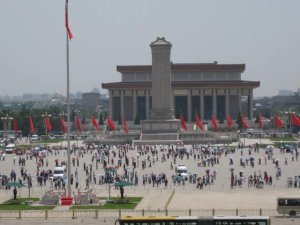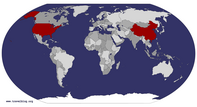Advertisement
Published: June 16th 2009

 Tiananmen Square
Tiananmen Square
Visit to the square on the 20th anniversary of the massacreHey everyone!!
Falling behind on my blog a little, but it has been a great past two weeks. First we took a trip to Beijing where we stayed 3 full days and got to see so much! Beijing is a completely different city than Shanghai, with a totally different atmosphere. It is centered around huge historical monuments such as the Forbidden City and Tiananmen Square, and spreads in a grid-like circular pattern away from this core. It is an odd mix of old and new—the Shanghai-like modern sky scrapers are sprouting from a field of old crickety neighborhoods full of dumpling stalls, fruit stores, mom and pop shops, and the occasional sketchy massage parlor. My family visited Tiananmen Square on June 4th—the twentieth anniversary of the Tiananmen Square massacre, a very controversial and covered up glitch in China’s recent history. Twenty years ago, hundreds of thousands of workers and students gathered at the square to peacefully protest for democracy and political reform. But the Chinese government reacted violently and ordered the crowd to be forcefully dispersed. Then the tanks rolled in and hundreds, if not thousands, were killed. Walking around Tiananmen Square (a foreboding expanse of concrete surrounded by imposing buildings)

 Persistant autocracy
Persistant autocracy
A view of the Forbidden City from Tiananmen square. Note the security guards standing at attention and the portrait of Mao in on the Main entrance to FC.on the anniversary of the massacre was eerie and bizarre. Security was unbelievable—all entrances to the gate were barred and you had to show your passport, have your bags searched, and then walk through a gauntlet of police before stepping into the square. Police were everywhere and there were many more patrolling around in civilian clothing. Just as with the last 20 years, there was no public acknowledgement of the incident, something I find astounding, alarming, and a sign that China has a long way to go in terms of acknowledging basic human rights such as free speech, political participation, and the right to life. The incident at Tiananmen Square remains hushed up or distorted; Chinese children today learn the following version of history; ‘Twenty years ago, a bunch of students forgot how much the government must sacrifice for their well-being. They naively became swept up in a rowdy crowd and had to be dispersed. A few people were injured.’ Since the incident, all Chinese schools have started to train their students in marching drills and military posture. They are meant to understand that every person is part of the military and that no one should act contrary to it,

 Old homes
Old homes
This doesn't capture the people or the best of the old neighborhoods (taking a photograph there felt too touristy, but this old home will soon be torn down--check out the laundry on display (I think I see a pink bra ;)as this would harm the greater good. My mom visited a children’s school and said it was amazing and a little scary how perfectly obedient the students were, and how they seemed to resemble a miny military as the paraded around school in their early morning marching exercises.
The current government here has tight control over almost everything; first of all, there is no free press and no system of checks and balances (aka; no independent judiciary). Then you have the one-child family planning policy intended to limit population. As a result, China today contends with a top-heavy elderly population. In addition, because males are the favored sex (as they are culturally bound to support their parents, while girls are bound to support their in-laws), the policy has resulted in female-specific abortions and an uneven gender ratio. In addition, the internet is regulated by about 60,000 cyber-police who weed out any sites deemed threatening or perverse (I hope this blog isn’t found!). The firewall is intense—I can’t access half of the sites I can get to in the states. Can’t even get to my Wesleyan email account!! I guess our liberal arts university poses a real threat to the

 gutted and smashed
gutted and smashed
Entire neighborhood are being wiped out...government! I had a lot of trouble finding a blog site that I could access and use, and guess what—NO YOUTUBE! This is just blasphemous. I know my chicas would die w/out You Tube. At least I can still access gmail and Facebook! In addition, property rights are limited, if not totally absent. The government can clear whole neighborhoods at whim and construct skyscrapers at will. While this allows for incredible expansion and rapid modernization, it comes at the cost of uprooting thousands of people and destroying the fun rickety old neighborhoods full of life. Most of the old neighborhoods in downtown Shanghai are being gutted and torn down in preparation for the 2010 World Expo. We walked through one of the few remaining ones the other day—they are sooo great! People were selling live bull-frogs the size of my face right on the street. Or live eels, one of which had escaped and was slithering away along the gutter. The narrow streets wind and bend every which-way and are decorated with everyone’s laundry—bras and underwear are on display for all to admire. The doors are teeny—you would have to duck to get into the cozy warm little rooms beyond.
Inside, we saw a bunch of old ladies playing dominos rowdily, yelling at each other in good rough tough-love humor. Further on a bunch of old men squatted around a pair playing Chinese checkers—everyone was commenting on the game and betting on the next move. In another little hovel a bunch of young shirtless guys were huddled around a low lying table, knees in the air, slurping down their lunch while watching the sports channel and commenting loudly on the game. These glimpses into the dirty, rickety homes of these people were great. Life was less about material things—as people didn’t have the resources to buy fancy nothings. Instead, everything was centered around people, relationships, creativity, laughter. What will happen to this culture when their homes are torn down? Where will the little old ladies go to play dominos? The government will move them all into high-rise apartments on the outskirts of the city. For many, the material quality of their new living space will be much greater than it was in their former hovels. But the vibe, buzz, and hum won’t be the same. The cultural and communal qualities will be lost. Which is worth more?
Not only
does the government have the ability to alter the physical landscape of cities at the drop of a hat, it can also impact vast natural landscapes. The best example of this is the Water Diversion Project in the West. Currently, the communist government is spending over $75 billion to construct the world’s largest dam (185 meters high and 2km long) on the Yangzi River. Not only will the dam destroy the beautiful Yangzi Gorge—once proclaimed as World Heritage Site for its unique gushing rivers flowing through steep canyons—it will flood an area the size of Singapore (creating a lake four hundred miles long) and displace 2 million people. These people will lose their hometowns and livelihoods as they are relocated. The dam will also threaten endangered species dependent on the unique ecosystems of the gorge, possibly pushing them to extinction. The purpose of the dam is to bring prosperity to the less developed regions in Western China. The dam will become the world’s largest hydro-electric energy producer, generating as much energy as 18 nuclear power plants. In addition, it will improve access to the West by boat, opening up the region to trade and commerce as it becomes a major port area. Finally, the dam will help with flood control—a problem that has claimed the lives of 1 million people in the past century. But there are worries that the dam is not entirely safe- cracks have already been found in parts of the dam that have been constructed. If the dam broke, 500,000 people living in nearby towns would be instantly killed. In addition, there are worries that the 400 mile long lake would become a huge septic tank as it would receive untreated sewage and waste from nearby cities.
The dam, the booming cities—all are demonstrations of power, of a country flexing its economic muscle. China is addicted to economic prosperity, and everyone is rushing to get a piece of the pie and make a profit. Mao died in 1976, so it has only been since about the 80s and 90s that Chinese-style capitalism has been unleashed. All the kids are graduating with technical degrees (computer science, engineering, ect) as these guarantee pathways to the highest paying jobs. I have trouble explaining and defending my liberal arts education in such a mechanically oriented society. Hardly anyone majors in philosophy, history, literature, anthropology, or sociology—these subjects simply aren’t seen as valuable. Universities emphasize technical thinking, not critical thinking—critical thinking leads to ‘dangerous’ (peaceful) protests like the one 20 years ago at Tiananmen Square.
So while the new capitalist economic system is ushering in an age of material wealth and higher standards of living, the age-old political system of autocratic rule continues to limit basic rights and freedoms. In the 21st century, China remains the world’s largest totalitarian regime, with all of the power concentrated in the hands of nine appointed (not elected) party officials. Walking around Tiananmen Square on the anniversary of the massacre, the presence of government power was palpable, almost tangible, yet—as always—impenetrable.
Well, sorry that this blog has turned into a miny historical review/political commentary. It’s just amazing because China is like a living paradox—half of it is this shiny-futuristic-high-tech booming country, while on the other hand it is stuck in this ancient autocratic/totalitarian system of government that has persisted for three thousand years. Will this system ever change? Well here I go again, haha, anyways, hehe—hope things are well with you all—write to me! I’ve loved hearing from a bunch of you so far and can’t wait to hear more! Missing ya—much love.
Advertisement
Tot: 0.157s; Tpl: 0.011s; cc: 5; qc: 46; dbt: 0.1132s; 1; m:domysql w:travelblog (10.17.0.13); sld: 1;
; mem: 1.1mb








